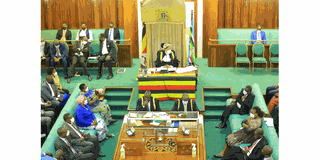Why Ugandan MPs should hold a master’s degree

Parliamentarians are seen during an August 4, 2022 afternoon's Plenary sitting. PHOTO | FILE | HANDOUT
What you need to know:
- It is time to raise the bar and require that all MPs hold at least a master’s degree, ensuring they are better equipped to tackle the pressing issues Uganda faces today. Education is the cornerstone of national development and societal transformation, promoting research, innovation, and informed leadership.
The Constitution entrusts MPs with making crucial decisions that shape not just the future of our nation but also our influence in East Africa, Africa, and on the global stage.
Yet, the current minimal qualification for becoming an MP in Uganda is an A-Level certificate (UACE). This requirement is outdated and insufficient in today's world, where governance requires deep knowledge and the ability to make informed, data-driven decisions.
It is time to raise the bar and require that all MPs hold at least a master’s degree, ensuring they are better equipped to tackle the pressing issues Uganda faces today. Education is the cornerstone of national development and societal transformation, promoting research, innovation, and informed leadership.
A 3rd July 2024 analysis by The Observer (after concerns of incompetence) revealed that out of Uganda’s 557 MPs, including ex-officio members, only 18 hold PhDs, 231 have master’s degrees, 251 possess bachelor’s degrees, 37 have diplomas, and 16 have only the minimum UACE qualification, with four MPs holding certificates equivalent to UACE. This alarming data highlights the need to significantly raise the educational qualifications of our legislators.
Uganda’s master’s programs are designed to foster critical thinking, enabling graduates to make informed, evidence-based decisions. The complexities of public policy today whether in healthcare, international trade, climate change, or regional security demand MPs with advanced educational backgrounds. MPs with master’s degrees are better positioned to understand these difficult issues, engage in meaningful debates, and draft laws that serve the long term interests of the nation.
A master’s degree signifies that the holder has undergone rigorous academic training and developed skills in research, analysis, and problem solving. These are critical skills for any legislator responsible for making decisions that impact millions of lives.
The last time I reviewed a parliamentary scorecard, which rates MPs based on their contributions in debates, the majority of MPs scored below average. This often stems from their inability to articulate issues effectively, either because they lack the depth of understanding or struggle with communication. Some even hesitate to speak due to a lack of confidence in their language skills, which is a disservice to both their constituencies and the nation.
It is hard when MPs struggle to express themselves or present coherent arguments on the floor of Parliament. In today’s global political arena, such shortcomings reflect poorly on the quality of leadership Uganda is projecting. Elevating the educational requirements for MPs will ensure a higher standard of representation.
The challenges facing Uganda today require leaders who not only understand these issues but also have the ability to think strategically about solutions. MPs with higher educational qualifications, particularly those with master’s degrees, are more likely to bring specialized knowledge and broader perspectives to these critical areas.
In many nations, MPs are required to have professional qualifications or advanced degrees, ensuring that their parliaments are composed of individuals with the intellectual capacity to govern effectively. Uganda’s ambition to become a middle-income country can only be achieved by ensuring that its leadership is up to the task.
Some may argue that MPs to have a master’s degree would exclude potential candidates, particularly those from underprivileged backgrounds. However, this argument can be addressed through equitable access to higher education. Thanks to NRM Government, Uganda has expanded its universities to underserved regions, providing more opportunities for people to obtain advanced degrees.
Additionally, scholarships and financial aid from the government or private sector can help promising leaders from disadvantaged backgrounds pursue higher education.
If someone can afford to run an expensive election campaign, they should also be in a position to invest in their education. Requiring MPs to hold a master’s degree is not about elitism but about ensuring that our leaders are well-prepared to meet the demands of governance.
As Uganda seeks to build a more prosperous, equitable, and democratic society, the qualifications of its leaders must align with the nation’s aspirations.
Uganda’s future depends on informed decision making grounded in expertise and knowledge. By raising the educational qualifications for MPs, we are not only enhancing the quality of leadership but also preparing our Parliament to lead Uganda into a brighter, more prosperous future.
Ivan Chemos, [email protected]




